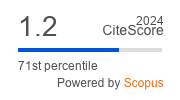Structure of a Dictionary Definition in Terms of Anthropocentrism
Keywords:
anthropocentrism, dictionary definition, nucleus of lexical meaning, periphery of lexical meaning, descriptive feature.Abstract
The human thinking, which has a universal nature and does not depend on cultural, historical, national or social factors, impact on all forms of human speech activity. Any language is anthropocentric in its nature due to the fact that it is generated by the human consciousness and cannot exist beyond it. In the proposed article the attempt is made to investigate how anthropocentrism manifests itself in such a specific kind of texts as dictionary definitions. The definitions of lexemes which denote biological objects perceived by humans on inductive and empirical level (elephant, wolf, fox, apple, pear, fruit, etc.) were studied. The specific feature of their semantic structure lies in the fact that it contains the central zone (intensional) with a minimum number of features, as well as the large periphery (implicational) which includes optional, probabilistic features, mainly empirical perceptual in their origin. It is shown that most descriptive features of biological objects (animals, plants, fruits) introduced into the dictionary definition are selected from the periphery of conceptual structures, and therefore they are optional and cannot be used to identify the object denoted by the word. Thus the statement in lexicography according to which the definition of the word should only contain the minimum of distinguishing features of an extra-linguistic object is refuted. Providing the examples of the usage of lexemes яблукоand apple in fiction it was demonstrated what exactly parameters of this fruit prove to be relevant for native speakers of Ukrainian and English. It is important to note that practical lexicographers while creating the definition for the lexeme яблуко/ apple intuitively reflect in it precisely those features which we identified as relevant by analyzing the usage of these words. That means that definitions indeed correlate with the structures of consciousness and may be studied as the reflection of cognitive activity of a human.
References
- Gak, V. (1998). Leksicheskoje Znachenije [The Lexical Meaning]. In: Bol’shoj
Lingvisticheskij Slovar’. Moscow, 262–265. - Nikitin, M. (1988). Osnovy Lingvisticheskoy Teorii Znachenija [Fundamentals of the
Theory of Linguistic Meaning]. Moscow: Vysshaia Shkola. - Zhinkin, N. (1958). Mekhanizmy Rechi [Mechanisms of Speech]. Moscow: Akademy of
Pedagogical Sciences. - Zhuykova, М. (2005). Objectivity in the description and analysis of cultural phenomena:
Some thoughts. Forum of Anthropology and Culture, 2, 117–121.
Sources
- CED – The Collins English Dictionary. Retrieved from http://www.collinsdictionary.com/
dictionary/english. - OALDCE – Hornby, A. S. (1982). The Oxford Advanced Learner’s Dictionary of
Current English. Vol. 1–2. Мoscow. - SJP – Słownik Języka Polskiego. Retrieved from http://sjp.pwn.pl/.
- SSRLJ (1950–1967) – Slovar’ Sovremennogo Russkogo Literaturnogo Yazyka. МoscowLeningrad: Academy of Sciences of USSR.
- SUM (1970–1980). Slovnyk Ukrajinskoii Movy, Kyiv: Academy of Sciences of Ukraine.







 Creative Commons «Attribution» 4.0
Creative Commons «Attribution» 4.0